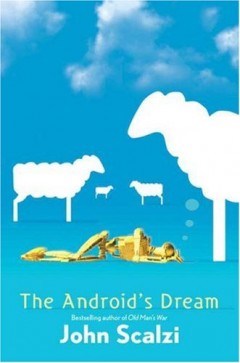The Android’s Dream, a novel by John Scalzi, is a science fiction tale that takes place in the not too proximate future. This was my first experience with Mr. Scalzi, and I came away impressed enough to want to read other titles by him that have garnered more acclaim. There are a variety of different tones and elements in the present novel, in use of which Scalzi demonstrates talent. He can be funny, clever, action-oriented, and even, on occasion and to a small degree, poignant. I was not always convinced by the way he mixed these different tones together, but overall the novel was a fun read. Scalzi exhibits the flair of a true storyteller with his well-refined and polished plot and cast of diverse characters.
The title refers to a line of specially bred sheep, named in honor of Philip K. Dick one supposes, which become the object of a hunt to prevent an intergalactic war. When a group of men of varying interests conspire to insult an alien diplomat during trade negotiations, the blowback leaves Earth on the brink of war. As things get increasingly out of hand — to the point where even the original conspirators begin to doubt the course they have plotted — an agent of the American government must find an Android’s Dream sheep to offer to the aliens, as appeasement, so they can sacrifice it in an important ceremony.
I do not know whether or not Scalzi has written sequels or other novels in this world, or if he plans to, but he has a knack for world creation that would seem to leave a lot of room for future work in this universe. There are different alien species with odd customs and cultures, eccentric politics, a variety of characters, and a number of odd social developments (including a religion devoted to Evolved Sheep whose adherents belong to one of two categories: true believers, and those with a sense of humor who want to make the Church’s prophesies come true for the fun of it). The message is not profound and the characters are not explored in the kind of depth that makes them stick with you long after you have closed the book for the last time, but the story is coherent, moves well, and provides a few interesting twists that give it a little kick at the right time.
The opening chapter is reminiscent of Douglas Adams in its silliness, though here it is more subdued than the concentrated absurdity characteristic of The Hitchhikers’ Guide to the Galaxy. A meeting of delegates of Earth and an alien species, the Nidu, is sabotaged by flatulence. The Nidu possess an olfactory acuity beyond anything that has evolved on our planet. It is so strong, and so sensitive to nuance, that the Nidu can actually communicate through smells.
One of the saboteurs has a device surgically implanted into his colon that allows him to alter the aroma of his intestinal gasses to send any message he wants to any Nidu nose within reach. He prepares with a meal sure to get the gas flowing, and during the meeting spends an hour or so insulting the mother and questioning the sexual prowess of a particularly excitable diplomat who holds his post not from having earned it, but from having been born into the right family.
The Nidu diplomat dies after being worked into a rage. The Earthling saboteur also dies, as his laughter at the sight of the fallen Nidu diplomat is too much for his clogged arteries to handle (the arteries are clogged because he, the son of a butcher, has spent his entire life eating meat almost exclusively. This departure from reality is, of course, the current orthodox viewpoint and can be forgiven on those grounds).
It is funny stuff, but the tone it establishes promises future sketches like one might expect from Monty Python. Instead, the story becomes more about the thrill of the chase and a race against time. All of it is competently handled, but, notwithstanding certain moments of levity, the rest of the book feels different from the first chapter. It is almost as if Scalzi had an idea of a humorous way to open a story, but ran short of funny and had to turn to something else to finish the book.

On the plus side, there is a fullness to the story and interactions that leaves one feeling satisfied, like one has read a complete tale and not just a teaser. There are some stories, on paper as well as celluloid, that feel unfinished. A viewing or reading of these leaves the spectator feeling shorted a confrontation or two between personalities, or as if there should have been one more obstacle to overcome. However good The Android’s Dream is, it achieved, I believe, its pinnacle.
The above tonal shift and a number of typographical errors are the only sins of commission, and these are minor. The only real sin of omission is a lack of engagement with the characters, who all have idiosyncrasies and are distinct, but who largely do not become real, profound people in our minds and hearts. It is for this reason, then, that after the book is done we feel the downslope of a mild exhilaration, but no great yearning or nostalgia for people we must say goodbye to and never again meet for the first time.















